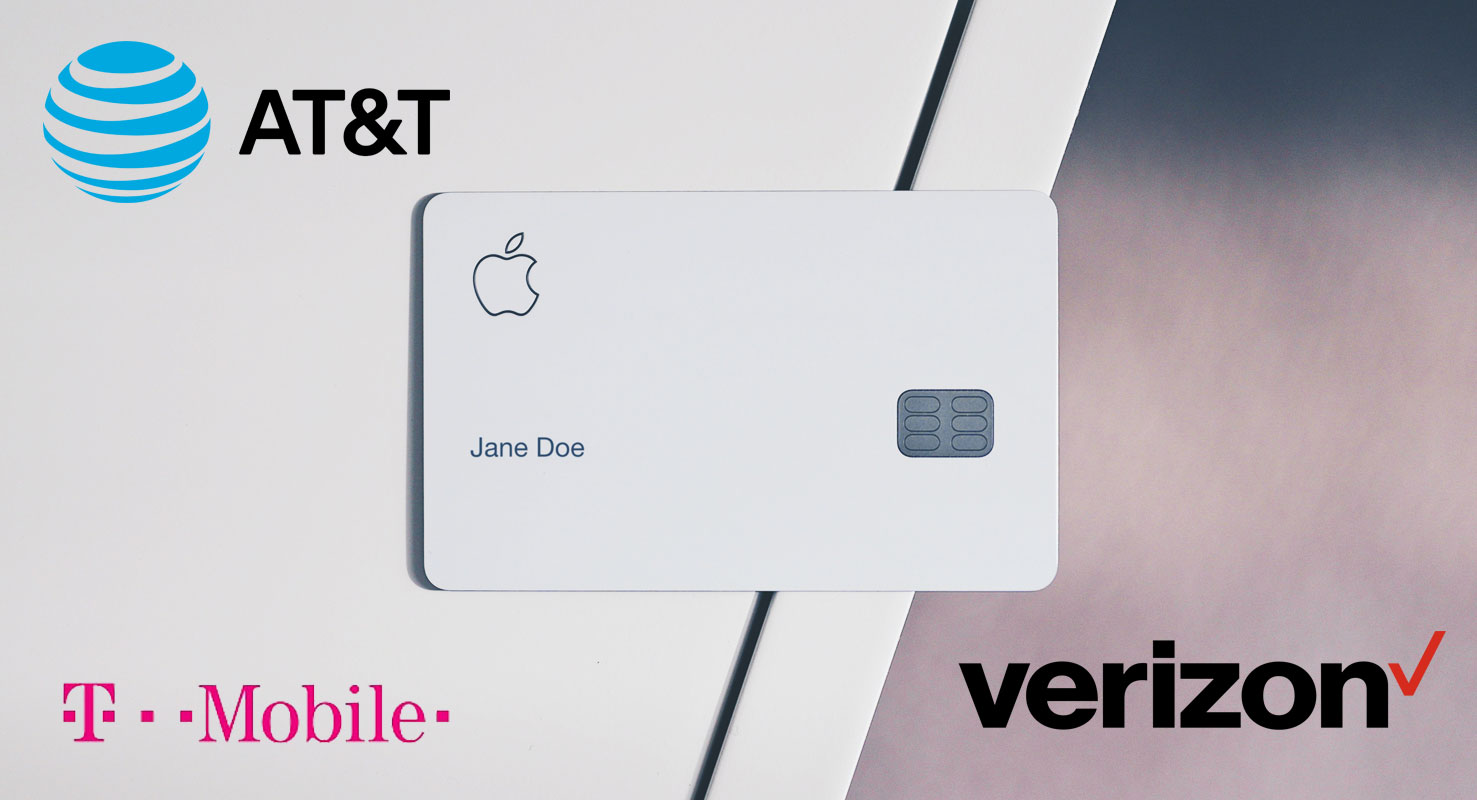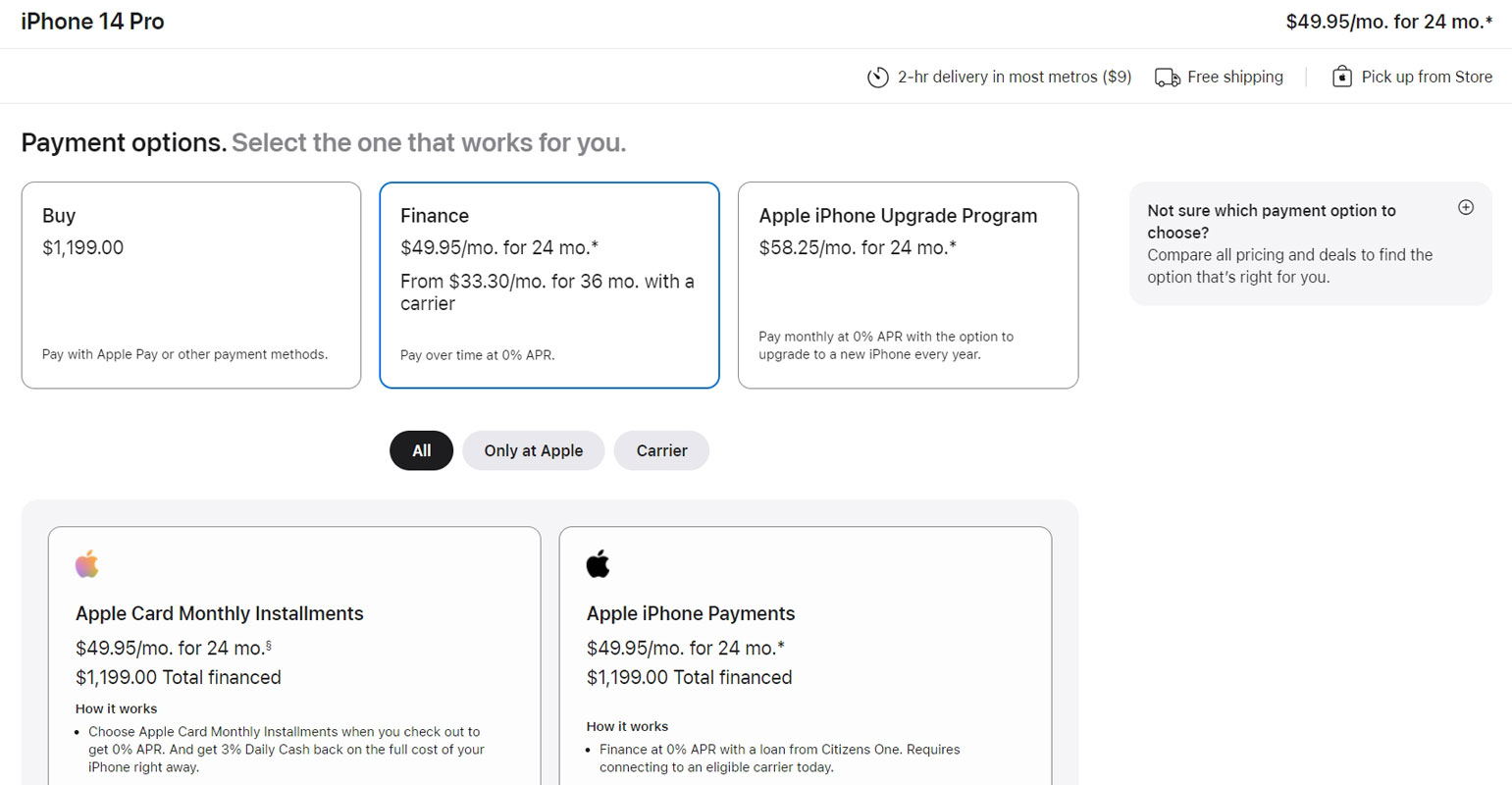A notable transformation is occurring in purchasing iPhones through Apple Card Monthly Installments. Apple made a recent announcement stating that in August, customers will no longer be able to acquire SIM-free iPhone models using Apple Card financing. Instead, they must select a carrier connection from AT&T, T-Mobile, or Verizon. Apple Card Limited to Three Carriers for iPhone Purchases. This alteration signifies a shift in the choices available to customers and highlights the increasing importance of carrier selection in conjunction with iPhone purchases. The decision to limit financing options to carrier-connected iPhones reflects Apple’s aim to streamline the purchase process and ensure that devices are seamlessly integrated with the chosen carrier from the moment of setup.

Apple Card Purchase
Apple allowed buyers to select the “Connect to a carrier later” option, allowing them to use the iPhone without a cellular connection or with any carrier. This flexibility allowed users to connect their iPhones purchased through this option to carriers like Mint Mobile or Google Fi.
Apple Card iPhone Purchase Carrier Restrictions
Beginning on August 15, Apple will mandate that any iPhone purchased via Apple Card Monthly Installments must be connected to AT&T, T-Mobile, or Verizon during the setup process. This policy effectively restricts iPhones bought with Apple Card financing from being used with other carriers.

Furthermore, the “Connect to a carrier later” option will no longer be available for purchases financed through Apple Card Monthly Installments, both online and in Apple Stores. It is important to note that the iPhones will still be unlocked, but a carrier connection will be required during the setup phase.
Apple provides the following explanation
Carrier-connected models of the iPhone 14 and iPhone 14 Pro are designed to be compatible with eSIM technology, allowing them to seamlessly connect to cellular voice and data services without the need for a physical SIM card.
If you have already completed the steps to authorize activation with AT&T, T-Mobile, or Verizon when purchasing your new iPhone online, it will arrive preconfigured and ready to use. Please turn on the device and follow the onscreen instructions to set it up and activate it with your chosen carrier. For eSIM activation, you will need a Wi-Fi connection during the initial setup process.
Alternatively, if you choose to “Connect to a carrier later” when purchasing your iPhone, you can activate the device with your preferred carrier when you receive it. If you are prompted to transfer your SIM card, follow the instructions on the screen to move the service from your previous iPhone.
Please note that this information pertains to the activation process of carrier-connected iPhone 14 and iPhone 14 Pro models, ensuring users’ smooth and straightforward experience.
The Implications of the Change
Apple’s decision to mandate carrier connection for iPhone purchases financed through Apple Card Monthly Installments carries several implications. Let’s explore the critical aspects affected by this policy change:
Limited Carrier Options
By enforcing carrier connection during setup, Apple restricts iPhone buyers to the three major carriers: AT&T, T-Mobile, and Verizon. Users will no longer be free to connect their iPhones to smaller or more niche carriers that might offer unique service plans or pricing.
Loss of Flexibility
The last option to connect to a carrier later allowed iPhone users to switch Mobile Carriers or use their devices without a cellular connection. This change limits the flexibility of iPhone owners and reduces their ability to choose mobile carriers based on personal preferences, network coverage, or cost-effectiveness.
Impact on Resale Value
The requirement for a carrier connection may impact the resale value of iPhones purchased through Apple Card Monthly Installments. It will affect the Potential buyers who prefer alternative carriers. Buyers in regions where AT&T, T-Mobile, or Verizon have limited coverage may be less inclined to purchase these locked devices.
Simplified Activation Process
On the positive side, the new policy ensures that iPhones bought with Apple Card Monthly Installments arrive ready to use. Customers who authorize AT&T, T-Mobile, or Verizon activation during purchase will experience a streamlined setup and activation. It eliminates the need for additional steps to connect with a carrier.
FAQs
Can I still purchase a SIM-free iPhone directly from Apple?
Yes, Apple still offers SIM-free iPhone models for direct purchase. The option to finance the acquisition through Apple Card Monthly Installments will require a carrier connection.
What if I don’t want to connect my iPhone to AT&T, T-Mobile, or Verizon?
Suppose you prefer to use a carrier other than the three specified by Apple. In that case, you must explore alternative financing options or purchase the iPhone outright without utilizing Apple Card Monthly Installments.
Will the carrier connection requirement impact existing iPhone owners?
No, this change only affects iPhones purchased through Apple Card Monthly Installments from August 15 onwards. Existing iPhone owners are not required to establish a carrier connection.
Can I switch carriers after connecting my iPhone?
Yes. You must connect your iPhone to AT&T, T-Mobile, or Verizon during the setup process; you can switch carriers later if desired. However, this policy change limits Mobile Carriers’ initial purchase choice.
Does this policy change apply to all iPhone models?
The carrier connection requirement applies to all iPhone models. The models should be purchased through Apple Card Monthly Installments, including the latest iPhone 14 and iPhone 14 Pro.
Wrap Up
To streamline the iPhone purchase process, Apple has required carrier connection for iPhones bought via Apple Card Monthly Installments. This change limits buyer flexibility regarding carrier choice and the ability to use the device without a cellular connection. While it simplifies the activation process, it may affect the resale value for potential buyers seeking alternative carrier options. Apple continues to innovate and adjust its offerings. This policy change represents another shift in its approach to iPhone sales.

Selva Ganesh is the Chief Editor of this Blog. He is a Computer Science Engineer, An experienced Android Developer, Professional Blogger with 8+ years in the field. He completed courses about Google News Initiative. He runs Android Infotech which offers Problem Solving Articles around the globe.



Leave a Reply